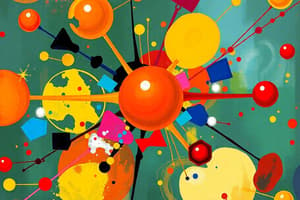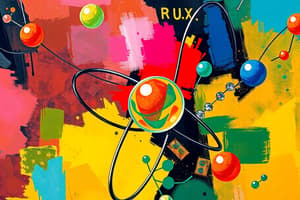Podcast
Questions and Answers
What is the basic unit of matter?
What is the basic unit of matter?
- Compound
- Atom (correct)
- Element
- Molecule
What is a positively charged particle of an atom?
What is a positively charged particle of an atom?
Proton
What is a neutral particle of an atom?
What is a neutral particle of an atom?
Neutron
What is a negatively charged particle that is found outside the nucleus?
What is a negatively charged particle that is found outside the nucleus?
What do we call two or more atoms held together by covalent bonds?
What do we call two or more atoms held together by covalent bonds?
What is a substance made up of atoms of two or more different elements joined by chemical bonds?
What is a substance made up of atoms of two or more different elements joined by chemical bonds?
Evaporation is the change of state from a liquid to a gas.
Evaporation is the change of state from a liquid to a gas.
Condensation is the change of state from a gas to a solid.
Condensation is the change of state from a gas to a solid.
What is it called when a solid changes directly to a gas without becoming a liquid?
What is it called when a solid changes directly to a gas without becoming a liquid?
What is the center of the atom that contains protons and neutrons called?
What is the center of the atom that contains protons and neutrons called?
What is an arrangement of elements separated into groups based on repeating properties?
What is an arrangement of elements separated into groups based on repeating properties?
What happens when you heat atoms?
What happens when you heat atoms?
What is the abbreviation for Hydrogen?
What is the abbreviation for Hydrogen?
What is the abbreviation for Helium?
What is the abbreviation for Helium?
What is the abbreviation for Lithium?
What is the abbreviation for Lithium?
What is the abbreviation for Beryllium?
What is the abbreviation for Beryllium?
What is the abbreviation for Boron?
What is the abbreviation for Boron?
What is the abbreviation for Carbon?
What is the abbreviation for Carbon?
What is the abbreviation for Nitrogen?
What is the abbreviation for Nitrogen?
What is the abbreviation for Oxygen?
What is the abbreviation for Oxygen?
What is the abbreviation for Fluorine?
What is the abbreviation for Fluorine?
What is the abbreviation for Neon?
What is the abbreviation for Neon?
What is the abbreviation for Sodium?
What is the abbreviation for Sodium?
What is the abbreviation for Magnesium?
What is the abbreviation for Magnesium?
What is the abbreviation for Aluminum?
What is the abbreviation for Aluminum?
What is the abbreviation for Silicon?
What is the abbreviation for Silicon?
What is the abbreviation for Phosphorus?
What is the abbreviation for Phosphorus?
What is the abbreviation for Sulfur?
What is the abbreviation for Sulfur?
What is the abbreviation for Chlorine?
What is the abbreviation for Chlorine?
What is the abbreviation for Argon?
What is the abbreviation for Argon?
How many protons, neutrons, and electrons does Boron have?
How many protons, neutrons, and electrons does Boron have?
How many protons, neutrons, and electrons does Carbon have?
How many protons, neutrons, and electrons does Carbon have?
How many protons, neutrons, and electrons does Fluorine have?
How many protons, neutrons, and electrons does Fluorine have?
How many protons, neutrons, and electrons does Helium have?
How many protons, neutrons, and electrons does Helium have?
How many protons, neutrons, and electrons does Oxygen have?
How many protons, neutrons, and electrons does Oxygen have?
How many protons, neutrons, and electrons does Sodium have?
How many protons, neutrons, and electrons does Sodium have?
What happens when you cool atoms?
What happens when you cool atoms?
What two elements make up water, and how many of each?
What two elements make up water, and how many of each?
What two elements make up salt, and how many of each atom?
What two elements make up salt, and how many of each atom?
What two elements make up carbon dioxide, and how many of each?
What two elements make up carbon dioxide, and how many of each?
Flashcards are hidden until you start studying
Study Notes
Atoms and Particles
- An atom is the fundamental unit of matter, comprising protons, neutrons, and electrons.
- Protons are positively charged particles found in the nucleus of an atom.
- Neutrons are neutral particles located in the nucleus and have no charge.
- Electrons are negatively charged particles that orbit the nucleus outside its center.
Molecular Structures
- A molecule consists of two or more atoms connected by covalent bonds.
- A compound is formed when atoms of two or more different elements are chemically bonded.
Changes of State
- Evaporation refers to the transition of a substance from a liquid to a gas state.
- Condensation is the process by which a gas becomes a liquid.
- Sublimation occurs when a solid changes directly to a gas without becoming a liquid.
Atomic Structure
- The nucleus is the core of an atom, containing protons and neutrons.
- The Periodic Table organizes elements according to their properties and atomic numbers.
Effects of Temperature on Atoms
- Heating atoms causes them to spread apart and move faster.
- Cooling atoms makes them slow down and come closer together.
Chemical Symbols
- Each element has a one or two-letter abbreviation, such as:
- Hydrogen: H
- Helium: He
- Lithium: Li
- Beryllium: Be
- Boron: B
- Carbon: C
- Nitrogen: N
- Oxygen: O
- Fluorine: F
- Neon: Ne
- Sodium: Na
- Magnesium: Mg
- Aluminum: Al
- Silicon: Si
- Phosphorus: P
- Sulfur: S
- Chlorine: Cl
- Argon: Ar
Atomic Composition
- Boron: 5 protons, 5 electrons, 6 neutrons (atomic number 5, atomic mass 11).
- Carbon: 6 protons, 6 electrons, 6 neutrons (atomic number 6, atomic mass 12).
- Fluorine: 9 protons, 9 electrons, 10 neutrons (atomic number 9, atomic mass 19).
- Helium: 2 protons, 2 electrons, 2 neutrons (atomic number 2, atomic mass 4).
- Oxygen: 8 protons, 8 electrons, 8 neutrons (atomic number 8, atomic mass 16).
- Sodium: 11 protons, 11 electrons, 12 neutrons (atomic number 11, atomic mass 23).
Chemical Formulas
- Water (H2O): Composed of two hydrogen atoms and one oxygen atom.
- Salt (NaCl): Consists of one sodium atom and one chlorine atom.
- Carbon Dioxide (CO2): Contains one carbon atom and two oxygen atoms.
Studying That Suits You
Use AI to generate personalized quizzes and flashcards to suit your learning preferences.




